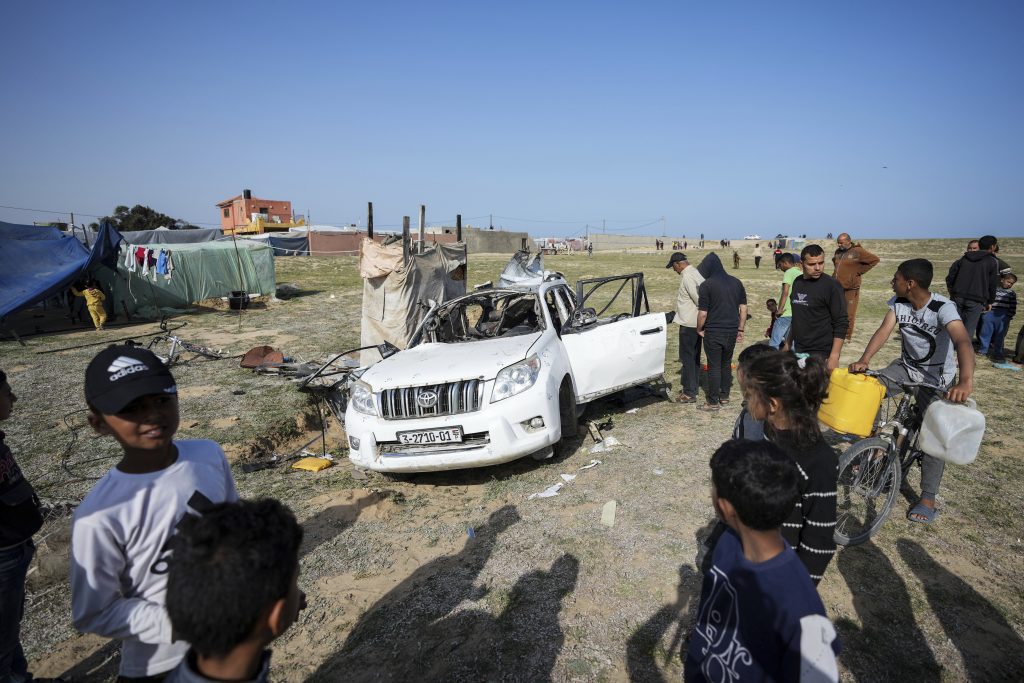By Wafaa Shurafa and Samy Magdy, Associated Press
DEIR AL-BALAH, Gaza Strip (AP) — An Israeli airstrike led to the deaths of seven aid workers from World Central Kitchen, causing the charity to temporarily halt the delivery of essential food aid to Gaza. The ongoing Israeli offensive has pushed hundreds of thousands of Palestinians to the brink of starvation.
Ships carrying around 240 tons of aid that had arrived a day earlier turned back from Gaza, as reported by Cyprus, which has been instrumental in attempting to establish a sea route for delivering food to the territory. Israel has permitted only a small amount of aid to enter the devastated northern Gaza, where experts warn of an impending famine.
Israeli Prime Minister Benjamin Netanyahu acknowledged that the country’s forces had carried out the “unintended strike … on innocent people.” He stated that officials were investigating the strike and would work to prevent such events in the future.
Video footage at a hospital in the central Gaza town of Deir al-Balah showed the bodies of several aid workers, some wearing protective gear with the charity’s logo. The victims included three British nationals, an Australian, a Polish national, an American-Canadian dual citizen, and a Palestinian, according to hospital records.
Additional footage following the strike displayed a vehicle with the charity’s logo printed across its roof to make it recognizable from the air. The projectile had punched a large hole through the roof.
In response to the escalating humanitarian crisis in northern Gaza, several countries worked to open a sea route, hoping to facilitate the entry of more aid. The United States and other countries have also airdropped aid, but humanitarian workers stress that such efforts alone are inadequate.
World Central Kitchen, a food charity established by celebrity chef José Andrés, played a crucial role in establishing the new route. Israel has prohibited UNRWA, the main U.N. agency in Gaza, from delivering aid to the north. Other aid groups have encountered significant difficulties in sending truck convoys north due to the military’s failure to grant permission or ensure safe passage.
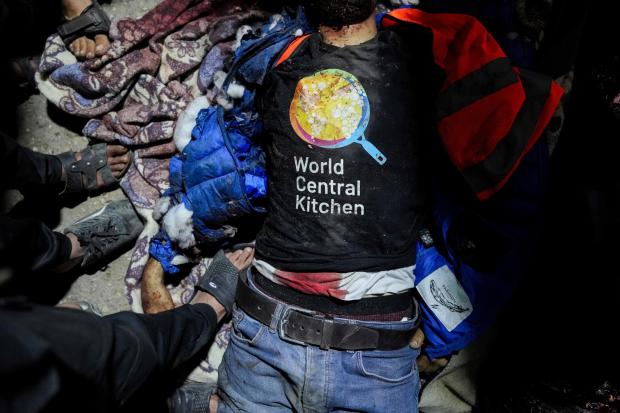
Andrés — whose charity operates in several countries impacted by wars or natural disasters, including Israel after the Oct. 7 attack that triggered the war — expressed profound grief over the deaths.
“The Israeli government needs to stop this indiscriminate killing. It needs to stop restricting humanitarian aid, stop killing civilians and aid workers, and stop using food as a weapon,” he wrote on X, formerly Twitter.
The charity stated that the team was traveling in a three-car convoy, which included two armored vehicles, and their movements had been coordinated with the Israeli army.
Rear Adm. Daniel Hagari, the top military spokesman, stated that officials at the highest levels have been “reviewing the incident” and that an independent investigation will be initiated.
Anera, a group in Washington that has been helping in the Palestinian lands for many years, said that due to the strike, it was pausing its own work in Gaza, where it had been assisting in providing about 150,000 meals daily.
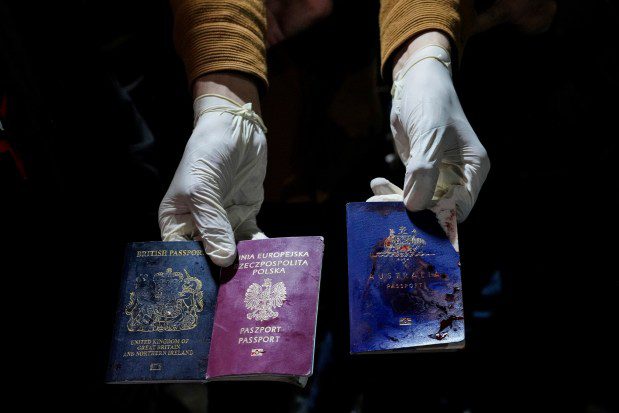
“The increasing dangers connected with giving aid mean we have no option but to stop our operations until our staff feel they can work without too much risk,” it said in a statement.
Jamie McGoldrick, the United Nations humanitarian coordinator for the Palestinian territories, said the strike was “not an isolated incident,” noting that around 200 humanitarian workers have been killed since the war broke out in October.
“This is nearly three times the death toll recorded in any single conflict in a year,” he said.
The conflict began when fighters led by Hamas, which has been labeled as a terrorist group by the United States, Canada and the European Union, invaded southern Israel in a sudden attack on Oct. 7, killing about 1,200 people and taking around 250 hostage. Israel reacted with one of the deadliest and most destructive offensives in recent history.
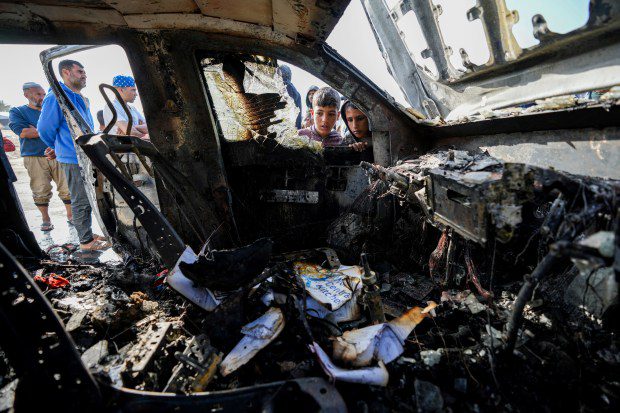
Tensions have risen across the Middle East, and an apparent Israeli strike on Iran’s consulate in the Syrian capital, Damascus, on Monday has elevated them even further. Iran and its allies have promised to retaliate to the strike, which killed two Iranian generals.
On Monday, three aid ships from the Mediterranean island nation of Cyprus arrived with some 400 tons of food and supplies organized by World Central Kitchen and the United Arab Emirates following a pilot run last month.
Cypriot Foreign Ministry spokesman Theodoros Gotsis said Tuesday that about 100 tons of aid had been unloaded before the charity suspended operations, and that the remaining 240 tons of aid would be taken back to Cyprus.
The United States, which has provided key military support for Israel’s offensive, has praised the sea route and plans to construct its own floating dock, with construction expected to take several weeks.
The U.S., Britain, Poland and Australia — whose citizens were among those killed, according to the hospital — called for an investigation or an explanation from Israel.
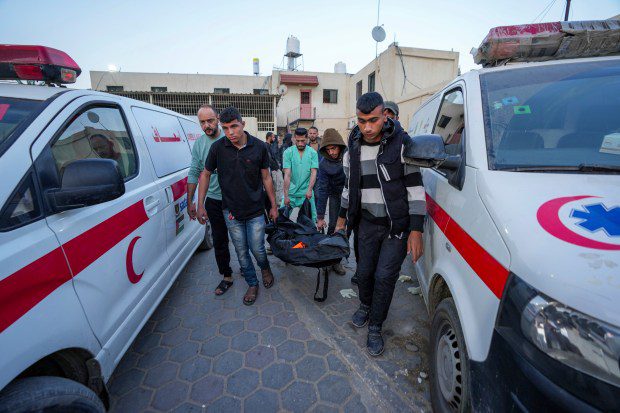
A representative from the National Security Council, Adrienne Watson, said the U.S. was saddened and deeply concerned about the strike, while British Foreign Secretary David Cameron described it as extremely upsetting.
“It is crucial that humanitarian workers are kept safe and able to do their work,” he wrote on X, stating that his country was working to confirm reports of the deaths of U.K. nationals.
Prime Minister of Australia Anthony Albanese confirmed the death of Zomi Frankcom, 44, from Melbourne. Damian Soból was also among those who died, as mentioned in a post on Facebook by Wojciech Bakun, the mayor of the southeastern Polish city of Przemysl, where the aid worker was from.
According to Gaza’s Health Ministry, over 32,900 Palestinians have died in the war, with about two-thirds being women and children. Israel attributes the civilian casualties to Palestinian fighters because they operate in densely populated residential areas, but the army rarely comments on individual strikes.
Two other apparent Israeli airstrikes on Monday night resulted in the deaths of at least 16 Palestinians, including five children, in Rafah, where Israel has pledged to expand its ground operation despite the presence of about 1.4 million Palestinians, most of whom have sought shelter from the fighting in other areas.
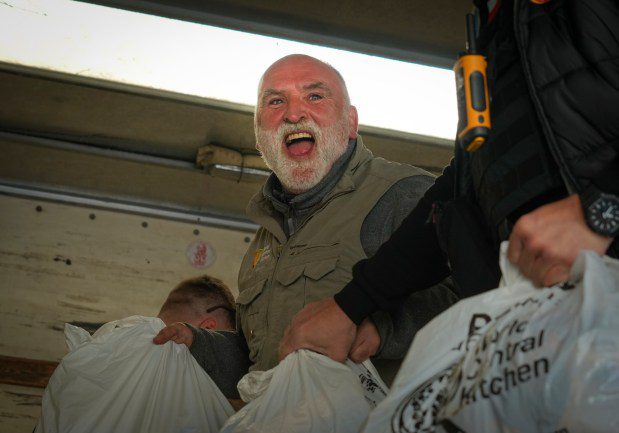
One of the strikes hit a family home, resulting in the deaths of 10 people, including five children, as per hospital records. Another strike hit a gathering near a mosque, resulting in the deaths of at least six people, including three children.
Humanitarian organizations have consistently urged for a humanitarian cease-fire, stating that it’s the only way to reach people in need. The United States, Qatar, and Egypt have been working for months to facilitate such a pause and a hostage release, but the indirect negotiations between Israel and Hamas are still deadlocked.
It is believed that Hamas is holding around 100 hostages and the remains of 30 others after releasing most of the others during a cease-fire in November in exchange for the release of Palestinians imprisoned by Israel.
Magdy reported from Cairo. Associated Press writer Monika Scislowska in Warsaw, Poland, Rod McGuirk in Melbourne, Australia, and Menelaos Hadjicostis in Nicosia, Cyprus, contributed.





